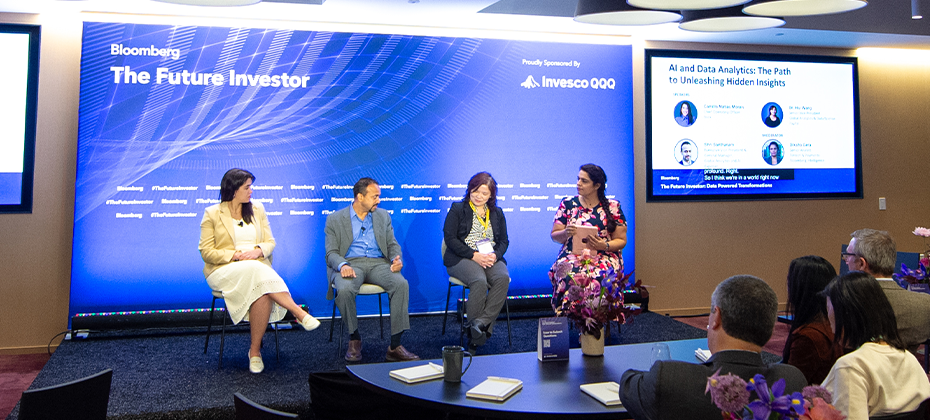
At Experian, we often say our people are our biggest superpower – and today, I’m thrilled to share that this belief has been recognised once again. Experian has been named one of the 2025 World’s Best Workplaces™ by Fortune and Great Place to Work® for the second year in a row.
This achievement reflects the culture we’ve built together – one that’s welcoming, inclusive, and rooted belonging. It’s a celebration of every colleague who brings their whole self to work, who lifts others up, and who powers opportunities for our clients, consumers, and communities.

We’ve made it our mission to create a workplace where everyone feels included, respected, and empowered. That’s why we’re proud to have earned top scores on the Corporate Equality Index and the Disability Equality Index, and to be recognised with the Outie Award for Workplace Excellence and Belonging.
These recognitions matter. But what matters most is how our people experience life at Experian. Whether it’s collaborating, innovating, or growing through world-class development of products, services and contributing to our communities, our culture is designed to help everyone thrive.
We’ve also made bold commitments to career development. Initiatives like Global Careers Week, the AI-driven performance coach Nadia, and the NextGen Forum – a global leadership development programme for emerging talent from across our regions – give our people the resources to take charge of their growth and build a “One Experian” mindset.
Being named one of the World’s Best Workplaces is a moment to celebrate but also a reminder to keep aiming higher. The world of work is evolving fast, and so are we. From embracing AI to enhancing our digital workplace experience, we’ll continue to push forward and listen to our people every step of the way.
Questions we will discuss:
- What does “retirement readiness” mean to you, and how can someone tell when they are financially ready to retire?
- Is there a magic number for retirement savings, and what factors should someone consider when setting a retirement goal?
- How can someone estimate their retirement expenses realistically?
- What are some common myths or misconceptions about how much money you need to retire?
- How should Gen Z, Millennials, and Gen Xers each approach retirement planning differently based on their stage of life?
- What are the biggest obstacles people face when trying to save for retirement, and how can they overcome them?
- How can you balance saving for retirement with paying off debt or supporting family today?
- What tools, calculators, or strategies can help people figure out if they’re on track for retirement?
- How can people prepare for unexpected costs or life changes that could impact their retirement plans?
- What’s one piece of advice you’d give someone just starting—or restarting—their retirement savings journey?
| Columns 1 | Column 2 | Column 3 | Column 4 |
|---|---|---|---|
| Row 1 Col 1 | |||
| Row 2 Col 1 | |||
| Row 3 Col 1 | |||
| Footer 1 | Footer 2 | Footer 3 | Footer 4 |

Credit Chat
Stretching your Dollars: Practical Tips to Cut Costs and Save More
February 5, 2025 3-4 PM ET
- What does “retirement readiness” mean to you, and how can someone tell when they are financially ready to retire?
- Is there a magic number for retirement savings, and what factors should someone consider when setting a retirement goal?
- How can someone estimate their retirement expenses realistically?

Greater transparency in buy now, pay later activity is key to helping consumers build their credit histories and supporting responsible lending. We have members of the military right now right out of high school and there’s not a lot of experience managing their own money. They’re quickly thrust into a place where they don’t have a support system to do that. We have members of the military right now right out of high school and there’s not a lot of experience managing their own money. They’re quickly thrust into a place where they don’t have a support system to do that. We have members of the military right now right out of high school and there’s not a lot of experience managing their own money. They’re quickly thrust into a place where they don’t have a support system to do that. We have members of the military right now right out of high school and there’s not a lot of experience managing their own money. They’re quickly thrust into a place where they don’t have a support system to do that. We have members of the military right now right out of high school and there’s not a lot of experience managing their own money. They’re quickly thrust into a place where they don’t have a support system to do that.
Experian North AmericaScott Brown, Group President, Financial Services

In a panel discussion at a Bloomberg-hosted panel titled "AI and Data Analytics: The Path to Unleashing Hidden Insights," Diksha Gera, a Senior Analyst at Bloomberg Intelligence, moderated a session that included key insights from Shri Santhanam, Executive Vice President and General Manager of Software, Platforms, and AI at Experian. Santhanam shared his thoughts on the transformative influence of generative AI (GenAI) within the financial sector, underlining its potential to revolutionize traditional practices. Enhancing Core Processes Santhanam illustrated how GenAI is altering the landscape of financial institutions. By automating intricate tasks, improving customer interactions, and expediting product development, this technology is pivotal. It transforms time-intensive tasks into more efficient processes, significantly enhancing productivity. This shift allows employees to focus on more strategic, higher-value work, thereby boosting the overall efficiency of financial institutions. Managing Risks and Ensuring Compliance With the adoption of GenAI comes a host of inherent risks—privacy concerns, data integrity issues, and challenges in regulatory compliance. Santhanam underscored the critical need to balance these innovative strides with stringent security measures that protect customer data and comply with existing regulations. The commitment to aligning practices with regulatory standards and ethical guidelines is paramount as the financial sector continues to integrate AI into its core operations. Governance and Collaboration Effective governance is essential for the successful deployment of GenAI in finance. Santhanam advocated for a collaborative approach that includes risk management, legal, and technical teams. The development of robust governance frameworks supports ethical and compliant AI applications, which are crucial for fostering responsible innovation within the industry. The Future of GenAI Looking forward, Santhanam pointed to several trends that are shaping the future of GenAI in the financial sector. These include pressures to reduce costs, increased demand for personalization, and the necessity for user-friendly interfaces. GenAI is set to play a key role in delivering personalized, efficient, and accessible financial services that respond to the evolving needs of customers. These insightful discussions, spearheaded by industry leaders like Bloomberg and moderated by experts such as Diksha Gera, emphasize Experian's leading role in navigating the potential and challenges of AI in financial services. The journey towards a more innovative and inclusive financial ecosystem is well underway, driven by the transformative capabilities of GenAI.

Building a strong foundation is key in maintaining your financial health. Here are 5 free resources for your personal finance journey.

Our purpose-driven culture has created an environment where 90% of employees say it’s a great place to work, and we couldn’t be prouder.
2024 Best Place to Work for Disability Inclusion


